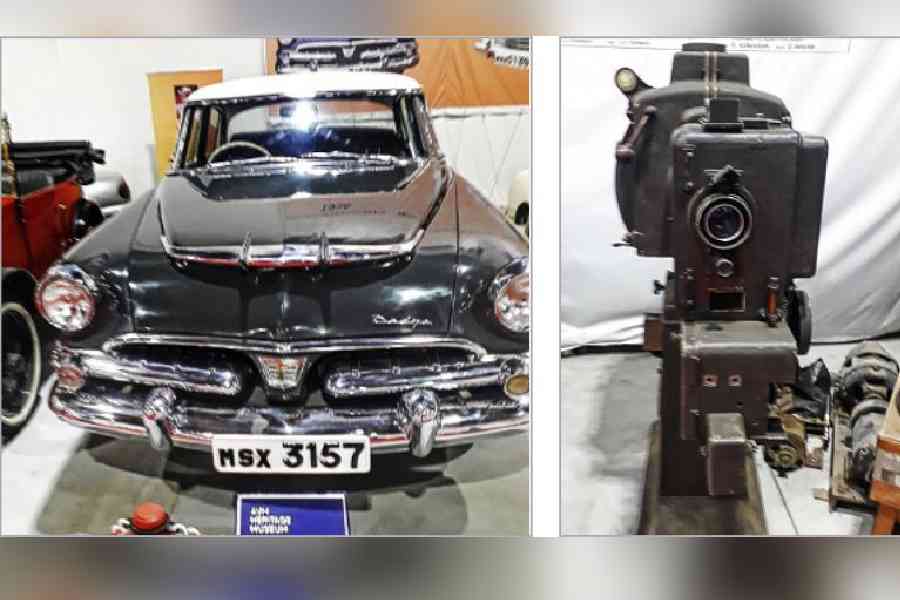Arcot Road in Kodambakkam, the heart of the southern film industry, may be getting a makeover with the expansion of the Chennai Metro but one landmark will continue to be perched over the skyline.
It’s the AVM Studios globe — rotating quietly atop a concrete cone — which has stood witness to nearly 75 years of film production in this part of the country.
AVM Studios, built during World War II in Chettinad and shifted to Chennai in 1949, “provides clues to and fragments of cinematic history”, writes Senjuti Mukherjee, a student of comparative literature and aesthetics, in her 2019 monograph, Chennai’s AVM Studios: Behind the Scenes of the Silver Screen.
It is run by AVM Productions, founded in 1934 and maker of “over 178 movies”, whose history intersects with both the national freedom movement and the evolution of Dravidian politics in Tamil Nadu.
Reflecting both continuity and change, a part of the studio complex has been converted into the new AVM Heritage Museum as a tribute to its genial founder, the late A.V. Meiyappan Chettiar (1907-79), as well as all those who worked there.
The studio — where five former chief ministers once plied their trade as hero, heroine or scriptwriter — remains functional but on a smaller scale compared with its peak days.
AVM Studios manager Viswanathan spelt out the five names: C.N. Annadurai, M. Karunanidhi, M.G. Ramachandran, Jayalalithaa (all of them became Tamil Nadu chief minister) and N.T. Rama Rao (who became chief minister of undivided Andhra Pradesh).
Current Tamil Nadu chief minister and DMK leader M.K. Stalin recently inaugurated the AVM Heritage Museum, billed as a “celebration of legacy, cinema, history and our (AVM Studios’) carefully preserved archives and equipment”.
One of the highlights of the museum is a plaque that commemorates the 50th year of the “revolutionary” Tamil film Parasakthi, based on a play that criticised the values of Brahminical society and released on October 17, 1952. The script was written by scriptwriter-turned-politician and former chief minister M. Karunanidhi, Stalin’s father.
Naam Iruvar (We Two) and Vaazhkai (Life), made by AVM, contained songs composed by nationalist poet Subrahmanya Bharathi and helped popularise his vision of Swaraj during the freedom struggle.
Making history
AVM Productions does not merely represent history but scripted history in its heyday.
It was the first to introduce dubbing (Harish Chandra, 1944), the first to try out playback singing (Nandakumar, 1938) and also the first to introduce playback with post-lip-synchronisation (Sri Valli, 1945).
Later productions like the Kamala Haasan-starrer Sakalakala Vallavan (1982) and Rajinikanth’s Sivaji: The Boss (2007) used newer light and sound technologies.
1935 camera
Vivid and colourful posters of old classics and recent films are displayed as a collage on one side of what was once the biggest shooting floor of AVM Studios.
Among the museum’s collection of period equipment are some of the earliest film cameras acquired by AVM Studios --- such as the Mitchell 35mm (1935, US) and the light and portable Arriflex 35mm (1960, Germany), which enabled outdoor shoots — apart from a range of “Light Filters”. “The AVM family (the fourth generation now runs the group) has held on to these old film equipment for decades. There’s a fairly large number of them, and we could not think of junking them,” Viswanathan said.
AVM’s grandson M.S. Guhan has included in the display more than 45 vintage cars and several old two-wheelers which he has acquired over the years, Viswanathan said. Most of these are linked to film studios and film personalities, he added. They include cars used in AVM films, a huge Dodge Kingsway 1956 (US) once owned by MGR, a Vauxhall (UK) 1951 model used by S.S. Vasan, founder of Gemini Studios, and some used by group patriarch A.V. Meiyappan himself, including a 1938 Vauxhall.
Records to films
A.V. Meiyappan was born on July 28, 1907, to a family belonging to a community of bankers (Nattukottai Chettiars) in Karaikudi, Chettinad.
He began with his father’s business --- a general store in Karaikudi that also sold gramophone records. He then went into producing gramophone records in old Madras in 1932, and entered film production in 1934.
His earliest films were shot in Calcutta and Pune.
Meiyappan, Viswanathan said, shot his first film, Alli Arjuna (1935), at New Theatres studio in Calcutta. His second film, Rathnavali, was also shot in Calcutta and his third, Nandakumar, in Pune.
“Those days, all the film studios were in the Calcutta and Bombay regions,” Viswanathan said. In 1940, AVM started his own studio in Madras, naming it Pragathi Studios.
World War II triggered widespread shortages, including in raw film stock, and the supply of electricity was severely restricted to new studios in Madras.
Meiyappan quickly shifted base to his native Karaikudi and built about 50 thatched sheds in nearby Devakottai, the nucleus of AVM Studios.
After World War II ended and wartime restrictions were lifted in 1948, Meiyappan moved back to the neighbourhood of Kodambakkam in old Madras in 1949 where he had bought land. With meticulous care he shifted his entire film production paraphernalia from Devakottai, Viswanathan said.
That was how the AVM Studios complex in Madras came to be built.










